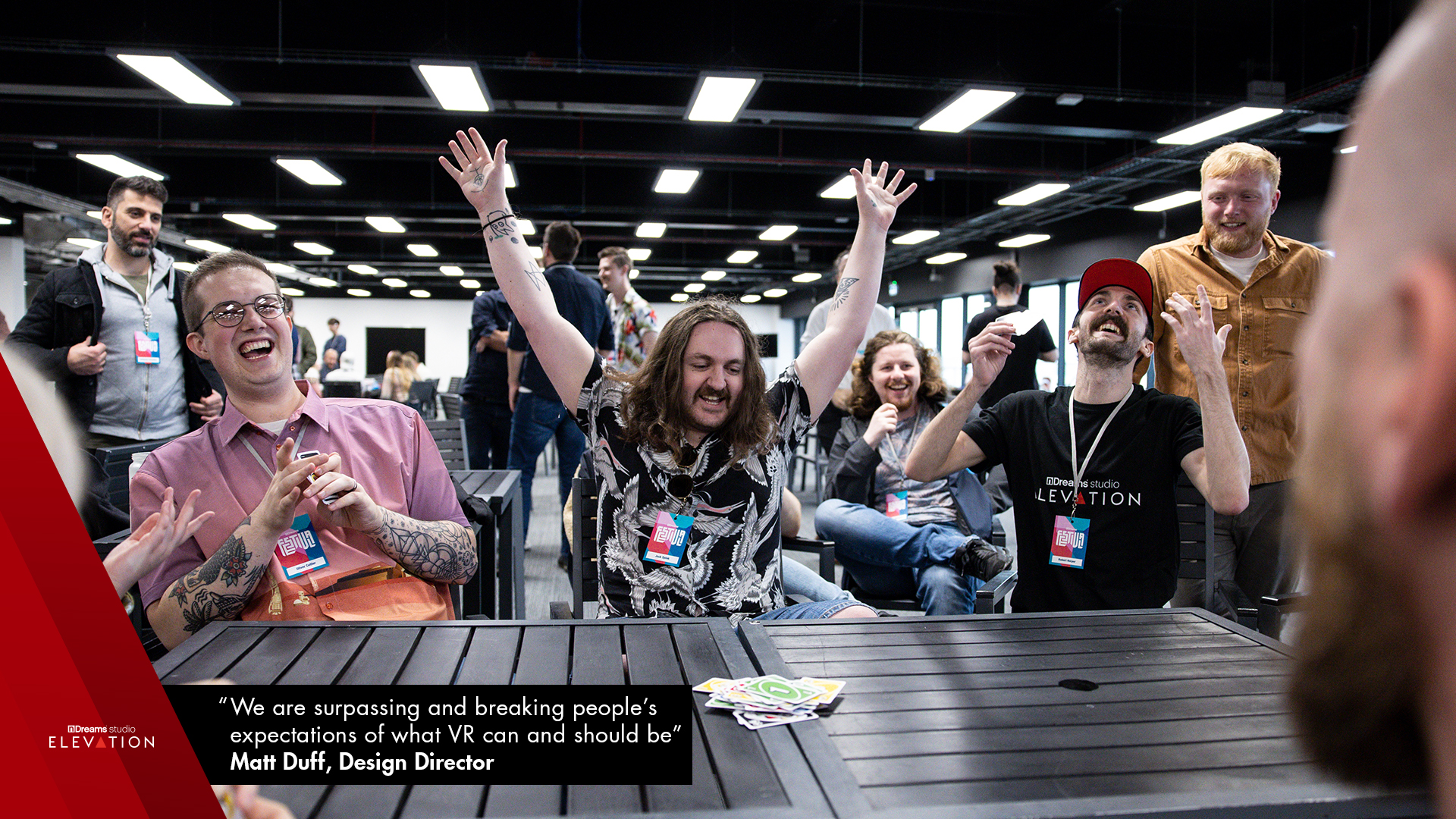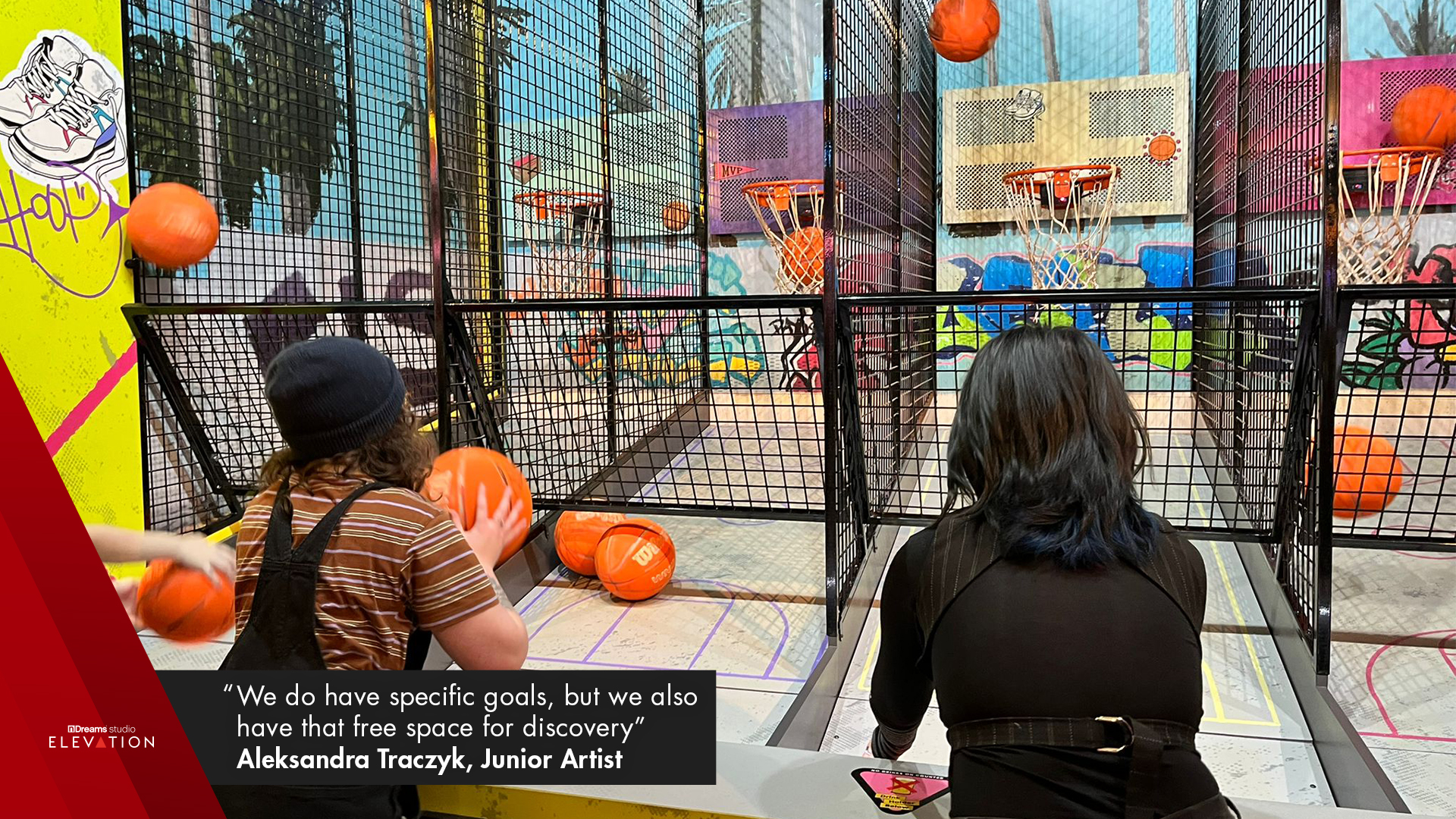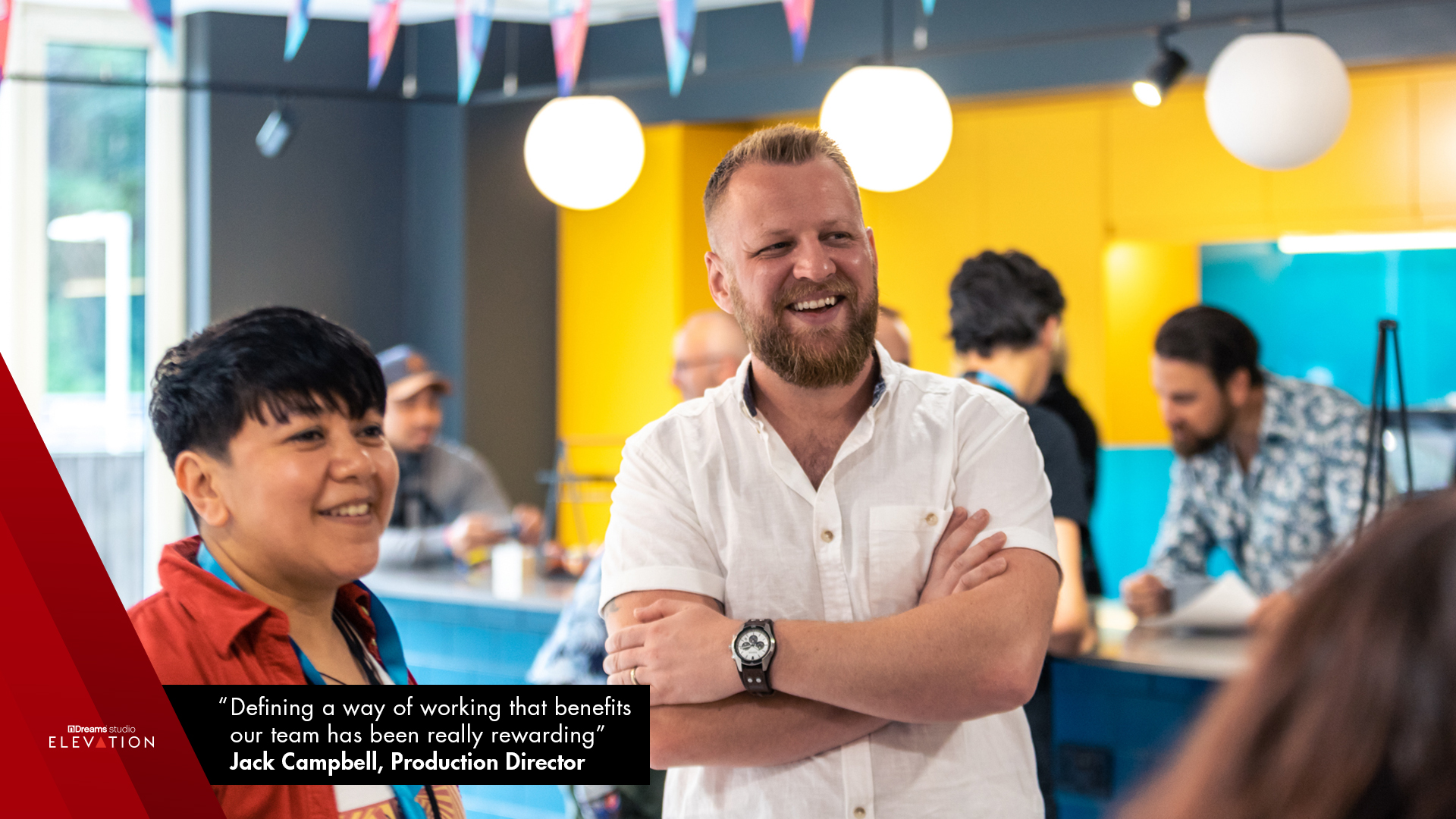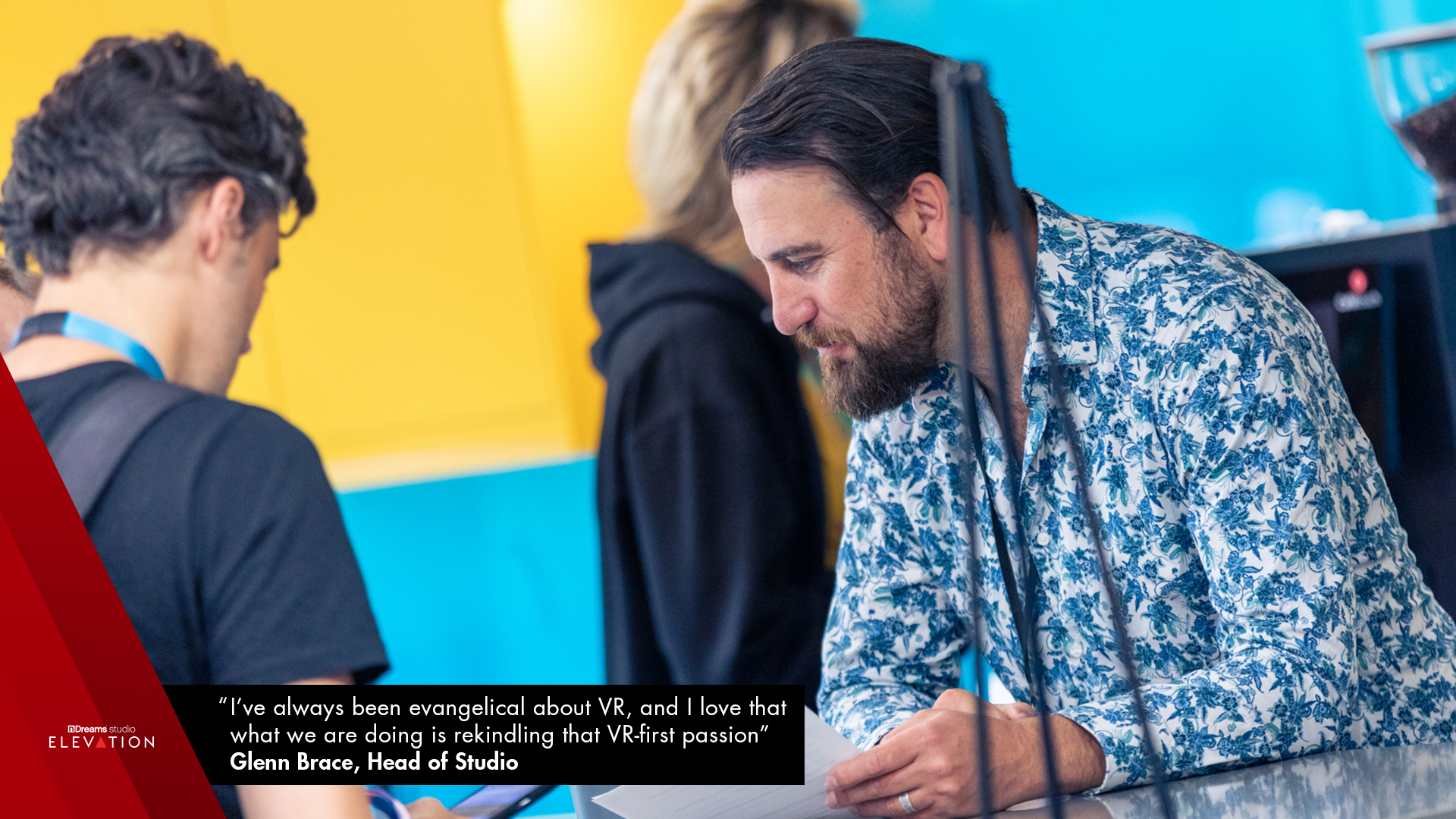Back in January 2022, we announced the formation of nDreams Studio Elevation. This brand new, fully remote studio would be headed up by Glenn Brace, an experienced creative leader, VR evangelist, and originator of nDreams’ chart-topping title Phantom: Covert Ops.
With its stated mission to create truly next-gen VR experiences and redefine the action-adventure genre, there has been much excitement around Elevation and its fast-growing team, who are stealthily developing very exciting things while recruiting best-in-class talent.
And with the team recently surpassing 50 team members, we took the opportunity to sit down with multiple Elevation team members – spanning a variety of specialisms – to learn more about what’s been going on behind the scenes!
It’s been around two years since nDreams Studio Elevation broke cover with its mission to redefine next-gen VR gaming. How do you reflect on that journey so far?
Paul Brooke, Technical Director: I think we're doing amazingly well – the only slightly frustrating part is that we can't show everyone just how amazingly well we're doing yet, since our project is unannounced!
But I am really looking forward to everyone getting to see more of what we’ve been working on when we can reveal more, and we’re hopeful that people will love it as much as we do.
Matt Duff, Design Director: The biggest reflection for me, and it sounds a bit cheesy, is that it’s almost been like a dream so far; everything has gone so smoothly and we’re making great progress on everything we set out to achieve.
Our goals are ambitious, so to meet them and even in some cases surpass them has been genuinely unbelievable. Of course, there is a long way to go, but I keep waiting for the dream to end. It hasn’t happened yet!

We’re at a place of real confidence with what we are working on, where we can show off the latest version to anyone and know that it will run well and play brilliantly. Our progress towards the vision, even at a relatively early stage, is clear to see.
Glenn Brace, Head of Studio: We started the studio knowing that we had an ambitious, VR-first plan, so it was important to put time aside to innovate, learn, fail, and pivot where needed. There have been loads of mini discoveries along the way that have shaped where we are, so staying agile and open-minded has been a big benefit to us and what we are making.
Building a studio from the ground up to more than 50 members today, what’s been your approach to identifying great talent and how much bigger do you expect to get?
Paul Brooke: Being fully remote has been a great benefit in terms of growing our team. We can attract great people from all over the UK, without them needing to consider things like commuting or relocating their families.
Our team is made up of specialists from all over the country, united by a desire to work flexibly and create amazing things, and that is hugely appealing for lots of people in the industry.
And as someone who is used to working in a startup environment, the added benefit here at Elevation is that we are part of a wider nDreams team that has been around for a long time, has great relationships with platforms and partners, and provides the stability that studios of our size often lack.
Matt Duff: I echo Paul’s points about the importance of remote, but I think our approach to work appeals to people as well. We don’t want this to be a high-stress environment; we want work to be fun.
This also comes through in our projects and we like to get prospective candidates experiencing this early, like “here is the game you could be working on.” I think we blew a lot of people’s minds early on with this, and of course it’s always helpful to have an exciting project when building a team!
Aleksandra Traczyk, Junior Artist: Honestly, before the very first interview that I had at Elevation, I was incredibly nervous – this was my first step into the games industry full-time, having been a freelancer previously.

But like Matt says, the first thing that struck me was how friendly everyone was. It was more like a chat between friends, and I quickly knew that I wanted to be part of it.
Without revealing the details, what’s the most exciting thing about working on Elevation’s ambitious action-adventure VR titles?
Aleksandra Traczyk: There are a lot of things that are exciting about it, but one of the main ones is actually playing what we have built so far. We have a long way to go but it already works, it’s fun to play – more so, we think, than a lot of what’s currently out there – and you can see the vision we have coming through really strongly.
Matt Duff: Simple answer from me: surpassing and breaking people’s expectations of what VR can and should be.
I think that is clearly the most exciting thing for me, especially from a design point of view. Here are the rules that previous VR games have set and established – let’s check them out, question them, and ultimately try to do our own thing.
We’re seeing how immersed people are getting in relatively simplistic prototype environments and can’t wait to see how they react as things get realer and realer.
Jack Campbell, Production Director: As a process-driven person, as much as I love the creative side of our mission, the most exciting thing for me has been defining the process of how we make games.

Being an industry veteran, I’ve worked in many less-than-ideal environments; awful crunch, terrible managers, immense pressure on people. So having an opportunity to define a way of working that benefits our team has been really rewarding.
Glenn Brace: I’ve always been evangelical about VR, and I love that what we are doing at Elevation is rekindling that VR-first passion. We want to not just make bold claims about what VR could be capable of, but to back it up with software.
Personally, since I love VR so much, the exciting bit is getting a great budget to work with an amazing team on dream projects that fulfil everything I’ve always wanted to see in VR!
How does being meeting-free and fully remote work for you? What are the benefits for work and life?
Paul Brooke: The benefits of no commute at all, ever!
Jack Campbell: People imagine that communication goes downhill when you're not in person, but I think the benefits of being remote have actually seen our communication increase. It's easier to speak to people.
I can speak to someone with a click of the button rather than chase them around a studio. Even when they got their headphones on it, people are more accessible than ever, and I think that gets overlooked.
Generally, when people talk about remote processes, they don't build their remote processes correctly.
The way we use open Teams channels, it becomes so comfortable that it's like you're in a room together. Some channels are hustling and bustling, and lots of chats. Some people are just sitting there, working quietly, speaking when they need to. So, it really does cater for all needs.
How does Elevation work and collaborate with the broader nDreams team?
Glenn Brace: This was one of our big objectives for Elevation from the start. So, what we try to do is be as up front and open accessible to all the other studios in terms of our processes, technology, and discoveries.
A big part of our approach is that all progress is documented, and that is also accessible to those in the wider nDreams teams. Everything is on show and we’re always happy to collaborate with fellow studios for mutual benefit.
On top of this, we also have great relationships with nDreams teams in HR, recruitment, publishing, finance, and more – another upside of being part of a larger group.
Paul Brooke: On the technical side, there is also plenty of cross-studio knowledge sharing within nDreams in the form of specialist Slack channels where, for instance, Unreal Engine tips are shared.
These are invaluable for anyone coming into the team. We get so many fixes from these sources, and all the people who would be otherwise isolated in their own studio can go directly to talk to others who have been through the same problems and found awesome solutions.
Since Elevation was founded, we’ve seen the launch of new VR hardware (including PS VR2 and Meta Quest 3), and even more great VR titles. What non-nDreams games do you see as the current benchmark and what leaps remain to be made?
Glenn Brace: I think production values in VR are really being pushed, with Horizon Call of the Mountain being one example, but developers are largely still on that discovery journey when it comes to true, VR-first gameplay innovation.

Like Matt was saying earlier about preconceptions of VR, we see it as our mission to really focus on VR-first gameplay and blow those preconceptions away. I think the subgenres and wholly new experiences you can have with the VR medium are still barely tapped.
For now, personally and for many of our team, Half-Life: Alyx remains that benchmark.
Andy Pattinson: Although there are some amazing games out there, we still think that there is a lot of room for further innovation in VR. There is so much potential still untapped.
Paul Brooke: While not at all the same genre as what we are creating at Elevation, I would give a nod to Beat Saber as a title that is so popular, so evergreen, and really plays to the strengths of VR with gameplay that looks and feels incredibly cool.
You’ve recruited team members from an impressive selection of companies. Give us an idea of this and how important that experience is for what Elevation is building.
Jack Campbell: When building a studio, it is important to have a core set of people that bring vast experience and knowledge. It’s important for us to create an environment where the next generation of developers can be properly mentored within a safe structure, and experience really helps with that.
It's about getting a diverse set of people from different backgrounds, different abilities, different personalities, and that way you're guaranteed to get the best out of everyone.
Matt Duff: In terms of where people have worked before, I don’t think that’s something that is really in our mindset.
It’s not the previous company we are investing in, it’s the individual that interests us. Great people with relevant skills and experience can come from studios of all sizes.
Andy Pattinson: There can be a sense of industry fatigue for creative people who have been at large companies for a long time. A lot of grind, navigating different processes, and we have had many people say that our process and what we do is refreshing to them.
I think that's a big part of why they chose to move across.
Similarly, there are team members making their first steps in the games industry with Elevation. How do you ensure it’s a great environment for personal development?
Aleksandra Traczyk: I think it's a very good balance between discovery and also kind of shadowing your senior talent because the industry is changing every week.
You can have worked six months or 30 years in the games industry, but if you're not going to follow what's happening, you will really, really fall behind. What I really like about Elevation is that we do have specific goals, but we also have that free space for discovery.
It’s not just about following what senior team members say, without any explanation. Instead, it’s about diving into things to see what you can find out. What’s the reason behind it? Did you achieve it? If you achieved it, how did you do so? If you failed, why did you fail?
And I think that's brilliant because you get so much more understanding of how things are actually working and it doesn't matter if you are an artist, if you program, or design – it applies to everything.
Failure is all part of the process and that’s totally fine. It’s such a healthy mindset.
I was just the gamer that was dreaming of getting into the games industry, but you read about certain studios and you get into this mindset that working in this industry must mean working ten hours or more a day. You will have to sacrifice a big part of your life.
Here, the reality couldn’t be more different!
For more on Elevation and to check out current vacancies at the studio, visit their website.